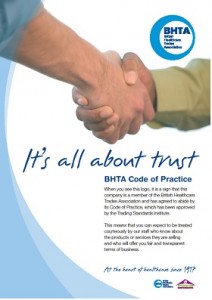Our mobility showroom is available to you as a direct...
A Valentines day question for you.... How important is trust in your business relationships? (and how to avoid the pitfalls of trading with unscrupulous healthcare suppliers.)
I recently visited a care home customer who was very excited to be taking delivery of 2 brand new reclining tilt in space chairs. They had purchased them at a ‘fantastic price!’ couldn’t believe their luck, a company had emailed a very ‘special offer’ The chairs were described as 'particularly well suited to users who are seated for long periods of time and at risk of developing pressure ulcers', and included a high risk cushion making it a very comfortable all day solution for use both at home and also in nursing homes.
You know what they say about when something appears to be too good to be true ............?
So we decided to undertake some market research of our own, regarding this ‘special offer’, and it quickly became very apparent that it was just too good to be true. It turned out that the customer had paid for a high risk chair but received a medium risk inferior version.
They did manage to extract a £300 refund from the company, but that is not the point!
This kind of miss selling could seriously compromise the health and wellbeing of our elderly and vulnerable loved ones. I have wondered how many other residents in care homes skin integrity is being jeopardised as a result of this unscrupulous company who clearly either have little knowledge of the potential gravity of their business practices, of simply are putting sales and profit above values, ethics and morals.
As companies within the healthcare sector, I believe that we have a moral obligation to do what is right by our clients, and to demonstrate integrity and ethics in the way in which we conduct business.
So how do you know who you can trust, when sourcing vital healthcare equipment?
As a business who has worked in the care sector for over 25 years, passionate about enabling people to live independently, safely and with dignity, we made a decision several years ago to join The British Healthcare Trades Association (BHTA), the UK's oldest and largest healthcare association, founded in 1917.
The BHTA has almost 500 company members, employing over 17,000 people – making or selling healthcare and assistive technology products that help people live more independently.
We became part of this association so we could clearly demonstrate through their Chartered Trading Standards Institute approved Code of Practice which,as a member, we sign up to, that we take our business seriously. We give our commitment to high levels of customer care that go above and beyond our legal obligations, giving customers confidence, and building relationships based on trust and adding value.

So how will you benefit from working with BHTA member companies like us?
For members of the Public - Wherever you see the BHTA logo, you know you’re dealing with a company you can trust. You’ll get clear information about your rights, receive a high standard of customer service and have access to an independent complaints process. If you're looking for an approved supplier who can assess your needs and help you to choose the right product or service
For Care Professionals - When you’re working with a client to maintain their independence, you want to know the products and services they’re using are right for them. BHTA members follow strict guidelines on customer care and won’t sell anything that doesn’t meet customers’ needs.
For Trade Customers - Working with BHTA member companies will ensure you receive the very best customer service consistently.
If you are looking to work with a supplier or retailer to maintain a client's independence, then contacting a company that is a BHTA member is the first step to ensuring that the company you build a relationship with is aiming for the highest possible standards in everything that they do.
Look out for these logos

I would like to leave you with a favourite saying of mine by John Ruskin, a leading art critic and prominent social thinker of the Victorian era.
'It's unwise to pay too much, but it's worse to pay too little. When you pay too much, you lose a little money – that is all. When you pay too little, you sometimes lose everything, because the thing you bought was incapable of doing the thing it was bought to do. The common law of business balance prohibits paying a little and getting a lot – it can't be done. If you deal with the lowest bidder, it is well to add something for the risk you run, and if you do that you will have enough to pay for something better."

